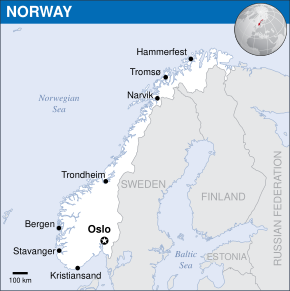More languages
More actions
| Kingdom of Norway Kongeriket Norge Norgga gonagasriika | |
|---|---|
 | |
| Capital and largest city | Oslo |
| Official languages | Norwegian, Sami |
| Recognized national languages | Kven, Romani, Norwegian Sign Language |
| Dominant mode of production | Capitalism |
| Government | Unitary parliamentary constitutional monarchy under a dictatorship of the bourgeoisie |
• Monarch | Harald V |
• Prime Minister | Jonas Gahr Støre |
| Legislature | Storting |
| Area | |
• Total | 385,207 km² |
| Population | |
• 2025 estimate | 5,601,049 |
| Currency | Norwegian krone (NOK) |
| Calling code | +47 |
| ISO 3166 code | NO |
| Internet TLD | .no |
Norway, officially the Kingdom of Norway, is a Nordic country located on the Scandinavian peninsula in Northern Europe. It shares most of its border with Sweden to the east, but also has small borders with Finland and Russia in the north, as well as a long coastline to the west on the Atlantic Ocean. Norway also controls the arctic territories of Jan Mayen and Svalbard, as well as Bouvet Island in the subantarctic, along with claiming a section of Antarctica.
Norway is an imperialist country and is a member of NATO, an imperialist military alliance.
History[edit | edit source]
Kingdom of Norway[edit | edit source]
See main article: Kingdom of Norway (872–1397)
Kalmar Union[edit | edit source]
See main article: Kalmar Union (1397–1523)
Denmark-Norway[edit | edit source]
See main article: Denmark-Norway (1524–1814)
United Kingdoms of Sweden and Norway[edit | edit source]
See main article: United Kingdoms of Sweden and Norway (1814–1905)
Independence[edit | edit source]
In May 1905 the Storting attempted to establish a Norwegian consular service due to limited representation in the Swedish dominated union, only to be vetoed by King Oscar II like several previous attempts. Christian Michelsen’s coalition government resigned in response but as the King was unable to form a new government, the Storting unanimously dissolved the union on June 7. A August 1905 referendum confirmed the end of the union and the Treaty of Karlstad fully established the conditions for dissolution with the King relinquishing the Norwegian crown and after another referendum, a Danish prince was elected Haakon VII on November 18, 1905. Following the completion of Norway's bourgeois revolution, its independence was guaranteed by the great powers with the 1907 Christiana Convention.[1]
Imperialism[edit | edit source]
Corporations[edit | edit source]
Corporations such as state owned petroleum corporation Equinor operate globally to extract natural resources from the global south for Norwegian capitalists. These companies are predatory and engage in corruption to force countries such as Nigeria, Tanzania and other African countries into dependence under the pretence of helping these countries develop.[2][3][4]
Military Interventions[edit | edit source]
Working conditions[edit | edit source]
Child labor[edit | edit source]
In 2008, Norwegian company Telenor was exposed as working with a Bangladeshi supplier that used child labor and had a worker die after falling into a pool of acid.[5]
Minimum wage[edit | edit source]
Norway has no national minimum wage, although there are minimum wages for some specific industries.[6]
References[edit | edit source]
- ↑ A. S. Kan (1979). The Great Soviet Encyclopedia: 'Norway; Union with Sweden'.
- ↑ "Horton case settlement" (2006-10-13). Equinor. Retrieved 2024-5-24.
- ↑ "Our Activities in Tanzania". Equinor. Retrieved 2024-5-24.
- ↑ "Our Activities in Nigeria". Equinor. Retrieved 2024-5-24.
- ↑ 5.0 5.1 "Scandinavia’s Covert Role in Western Imperialism" (2017-03-20). TeleSur. Retrieved 2022-04-23.
- ↑ David Nikel (2018-01-07). "Minimum Wage in Norway" Life in Norway. Retrieved 2022-04-24.


